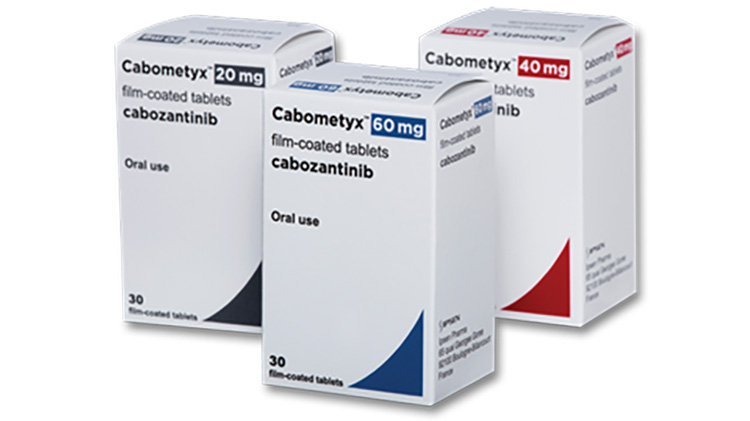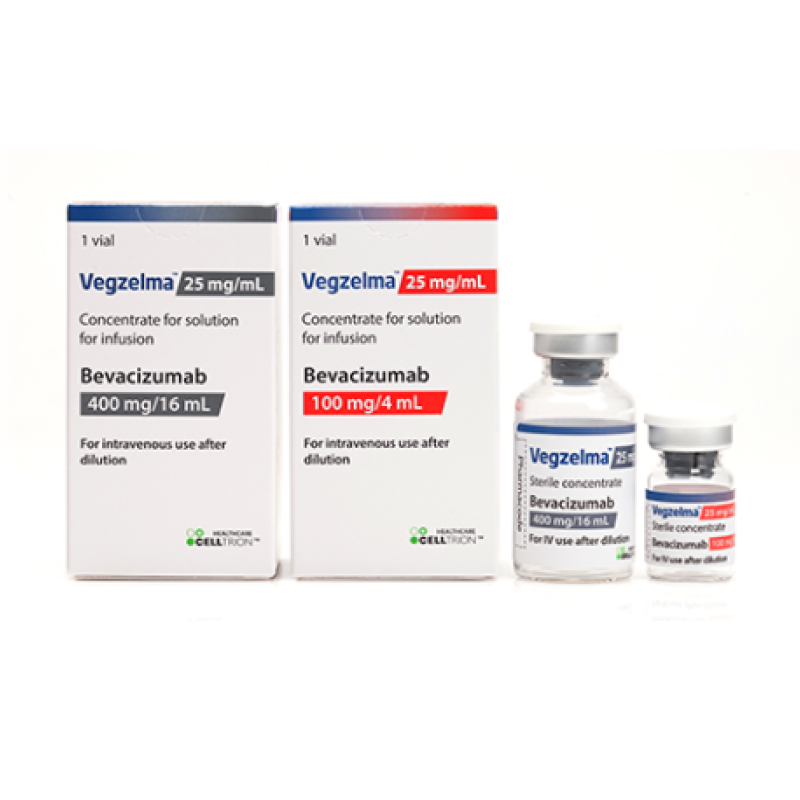Cabometyx (cabozantinib) vs Vegzelma (bevacizumab-adcd)
Cabometyx (cabozantinib) vs Vegzelma (bevacizumab-adcd)
Cabometyx (cabozantinib) is a tyrosine kinase inhibitor that targets multiple pathways involved in tumor growth and angiogenesis and is approved for the treatment of various cancers, including renal cell carcinoma and hepatocellular carcinoma. Vegzelma (bevacizumab-adcd) is a biosimilar to the original bevacizumab (Avastin) and is a monoclonal antibody that inhibits angiogenesis by targeting vascular endothelial growth factor (VEGF), used in the treatment of several cancers such as colorectal, lung, and renal cancer. When deciding between Cabometyx and Vegzelma, one should consider factors such as the specific type of cancer, the stage of the disease, previous treatments, potential side effects, and the mechanism of action of each drug, in consultation with a healthcare provider.
Difference between Cabometyx and Vegzelma
| Metric | Cabometyx (cabozantinib) | Vegzelma (bevacizumab-adcd) |
|---|---|---|
| Generic name | Cabozantinib | Bevacizumab-adcd |
| Indications | Renal cell carcinoma, hepatocellular carcinoma, medullary thyroid cancer | Colorectal cancer, non-small cell lung cancer, glioblastoma, renal cell carcinoma, cervical cancer |
| Mechanism of action | Tyrosine kinase inhibitor | Monoclonal antibody, angiogenesis inhibitor |
| Brand names | Cabometyx, Cometriq | Vegzelma |
| Administrative route | Oral | Intravenous |
| Side effects | Diarrhea, fatigue, nausea, decreased appetite, hypertension, etc. | Epistaxis, headache, hypertension, rhinitis, proteinuria, etc. |
| Contraindications | Hypersensitivity to cabozantinib or any component of the formulation | Hypersensitivity to bevacizumab, bevacizumab-containing products, or any component of the formulation |
| Drug class | Tyrosine kinase inhibitor | Monoclonal antibody |
| Manufacturer | Exelixis, Inc. | Celltrion, Inc. |
Efficacy
Cabometyx (Cabozantinib) Efficacy in Kidney Cancer
Cabometyx, the brand name for cabozantinib, is an oral medication that has shown efficacy in the treatment of advanced kidney cancer, specifically renal cell carcinoma (RCC). Cabozantinib is a tyrosine kinase inhibitor that targets multiple pathways involved in tumor growth and angiogenesis, which is the process of forming new blood vessels that tumors need to grow. In clinical trials, cabozantinib has been shown to improve progression-free survival in patients with advanced RCC compared to standard treatments. One pivotal Phase III trial, METEOR, demonstrated that cabozantinib significantly improved median progression-free survival compared to everolimus, a previously established treatment for advanced RCC, highlighting its potential as an effective option for patients with this disease.
Furthermore, cabozantinib has been associated with an increase in overall survival and a higher objective response rate, meaning that a greater number of patients experienced a reduction in tumor size. These outcomes suggest that Cabometyx can be an important therapeutic option for patients with advanced renal cell carcinoma, particularly for those who have progressed after initial therapy. It is important to note that the side effect profile of cabozantinib should be taken into consideration when evaluating its use, as it can cause hypertension, diarrhea, and other potentially serious adverse events.
Vegzelma (Bevacizumab-adcd) Efficacy in Kidney Cancer
Vegzelma, a biosimilar to the original bevacizumab, is designed to mimic the pharmacological effects of the reference product in treating various cancers, including kidney cancer. Bevacizumab is a monoclonal antibody that inhibits angiogenesis by targeting vascular endothelial growth factor (VEGF), a key driver in the formation of blood vessels that supply tumors. In the context of kidney cancer, bevacizumab has been used in combination with interferon-alpha and has shown a significant improvement in progression-free survival compared to interferon-alpha alone. This combination has been an option for the first-line treatment of patients with metastatic renal cell carcinoma.
As a biosimilar, Vegzelma is expected to have similar efficacy and safety profiles to the original bevacizumab product, providing a potentially more cost-effective treatment option without compromising patient outcomes. Clinical studies conducted to support the approval of Vegzelma have demonstrated no clinically meaningful differences in efficacy, safety, and immunogenicity when compared to the reference bevacizumab in patients with advanced or metastatic cancers, including kidney cancer. However, it is essential for healthcare providers to review the latest clinical data and guidelines when considering Vegzelma for the treatment of renal cell carcinoma to ensure the best possible patient outcomes.
Regulatory Agency Approvals
Cabometyx
-
European Medical Agency (EMA), European Union

-
Food and Drug Administration (FDA), USA

-
Health Canada

-
Therapeutic Goods Administration (TGA), Australia

Vegzelma
-
European Medical Agency (EMA), European Union

-
Food and Drug Administration (FDA), USA

Access Cabometyx or Vegzelma today
If Cabometyx or Vegzelma are not approved or available in your country (e.g. due to supply issues), you can access them via Everyone.org.
How it works

Make an enquiry
Choose the medicine you want to buy, answer a couple of questions, and upload your prescription to speed things up. We’ll get back to you within 24 hours.


Make an enquiry
Choose the medicine you want to buy, answer a couple of questions, and upload your prescription to speed things up. We’ll get back to you within 24 hours.


Breeze through the paperwork
We'll guide you through the required documents for importing unapproved medicine, ensuring you have all the necessary information.


Get a personalized quote
We’ll prepare a quote for you, including medicine costs and any shipping, administrative, or import fees that may apply.


Receive your medicine
Accept the quote and we’ll handle the rest - sourcing and safely delivering your medicine.

Some text on this page has been automatically generated. Speak to your physician before you start a new treatment or medication.
Let's talk
If you have any questions, call us or send us a message through WhatsApp or email:
Contact us




